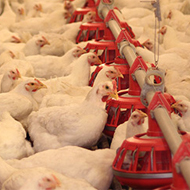
Free online course will explain intensive livestock systems
With consumer confidence "at an all time low" following the horse meat scandal, the Royal Veterinary College (RVC) has launched a free online course to explain how intensive livestock systems work.
The three week, part-time, flexible course focuses on how food is made safe, the costs of its production, and the people involved from the farm to the table.
There is a specific focus on the pork and egg sectors which have some of the most developed production systems in the agri-food sector.
The course only requires two or three hours a week of study time, and incorporates quizzes, video and live discussion as well as written course material.
A certificate will be given to all participants who complete the course.
Prof Stephen May, deputy principal at the RVC, said: “I am really excited to be involved with this novel and enterprising course, which is a first for the RVC.
"Food is a subject which is literally ‘a matter of life and death’ for us all, so it is important that all members of society can understand and contribute to the important debate on our food supply and its safety.”
Enrolment for Food for Thought - The truth about food systems will start on Monday (10 with the course running from February 24 to March 14.
For further information, or to self-enrol on the course, please visit academy.rvc.ac.uk/info
This course has been funded by the Advanced Training Partnership in Intensive Livestock Health and Production.
– This article initially made reference to the RCVS being involved in the course. This was an error and we apologise for any confusion.



 HMRC has invited feedback to its communications regarding the employment status of locum vets and vet nurses.
HMRC has invited feedback to its communications regarding the employment status of locum vets and vet nurses.